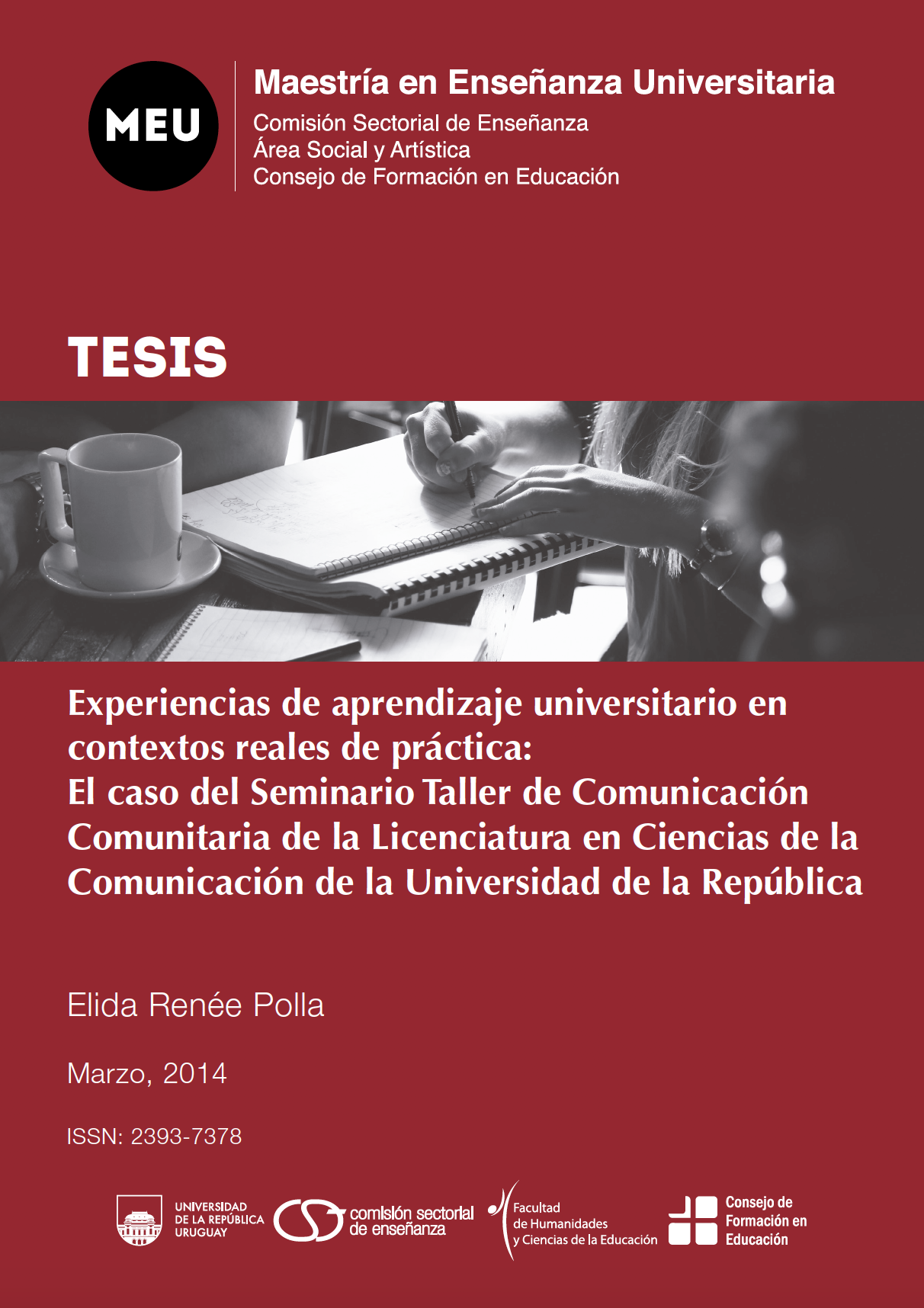Resumen
Este trabajo intenta conocer y comprender el papel de las prácticas preprofesionales en contextos reales en la formación de los estudiantes de la Universidad de la República a partir del caso del Seminario Taller de Comunicación Educativa y Comunitaria (STCEC) de la Licenciatura en Ciencias de la Comunicación. La investigación tiene una perspectiva cualitativa. Se realizó un análisis de contenido de materiales escritos por los estudiantes donde ellos reflexionan sobre el curso, lo que aprendieron en él y cómo lo aprendieron. El recorte realizado en la investigación analiza cómo los estudiantes ven su proceso de aprendizaje en este curso con el fin de reflexionar luego acerca de los procesos de aprendizaje realizados por los estudiantes de la Universidad de la República en el nuevo contexto que se conforma con la Segunda Reforma Universitaria, la nueva Ordenanza de estudios de grado y los nuevos planes de estudio que se están aprobando en cumplimiento de la Ordenanza. Las fuentes documentales son las autoevaluaciones que los estudiantes entregan con el informe final del curso, las evaluaciones del curso realizadas por los estudiantes en la penúltima clase y las entrevistas realizadas a ex estudiantes del Seminario Taller de Comunicación Educativa y Comunitaria en el proceso de sistematización de los diez primeros años del curso. El análisis realizado nos permite decir que este tipo de práctica juega un papel importante en la formación universitaria porque da a los estudiantes la posibilidad de enfrentarse al “mundo real del trabajo” antes de la graduación. Les aporta experiencia y vivencias, ven las dificultades que pueden encontrar en el futuro trabajo, vencen la idea de que no pueden ejercer a ese nivel y se acercan al rol profesional. En estas experiencias los estudiantes tienen la oportunidad de trabajar con actores no universitarios que tienen sus propios saberes y aprender en un proceso interactivo. La práctica se convierte en una experiencia integral donde se articulan las funciones de enseñanza (aprendizaje), extensión (interacción social) e investigación (producción de conocimiento) y se da el diálogo entre actores universitarios y no universitarios. Las prácticas realizadas en grupo con compañeros de su mismo nivel les brinda un aprendizaje muy importante que les permite crecer a nivel personal y profesional. Trabajando en grupo se aprende a escuchar, a priorizar los intereses comunes, a intercambiar opiniones, a negociar.
Palabras claves
Comunicación, Práctica preprofesional, Comunitaria, Aprendizaje, Educación, Enseñanza, Encuentro con el "otro", Integralidad
Abstract
This work attempts to know and understand the role of pre-professional practices in real contexts in the training of the students at the University of the Republic from case of the Seminar Workshop of Educational Communication and Community of the Bachelor of Communication Studies. The research has a qualitative perspective. An analysis of content was performed of written materials by students where they reflect on the course, what they learned and how they learned it. The cut made in research, studies how students see their learning process in this course in order to reflect about learning processes carried out by the students of the University of the Republic in the new context that conforms to the Second University Reformation, the new Ordinance in graduate studies and the new curricula which are being approved in compliance with the Ordinance. The documentary sources are the self-evaluations that students delivered with the final report of the course, the course evaluations carried out by students in the penultimate class and the interviews with former students of the Seminar Workshop of Educational Communication and Community in the process of systematization of the first ten years of the course. The analysis allows us to say that this type of practice plays an important role in university education because it gives students the chance to confront the «real world of work» before graduation. It gives them experiences, they see the difficulties that can be found in the future job, they overcome the idea that they cannot exercise at that level and they approach the professional role. In these experiences, students have the opportunity to work with non-university actors who have their own knowledge and learn in an interactive process. The practice becomes an integral experience where the functions of teaching (learning), extension (social interaction), and research (knowledge production) are articulated and dialogue between university and non-university actors takes place.
Keywords
Communication, Pre-professional practice, Community practice, Teaching, Learning, Education, encounter with the "other", Integrality
Director(es) de tesis
- Mag. Mercedes Collazo
Tribunal
- Pablo Martinis
- Gabriel Kaplún
- Humberto Tommasino
- Mercedes Collazo
Fecha de Aprobación
24/03/2014
Dictamen
Aprobado con mención

